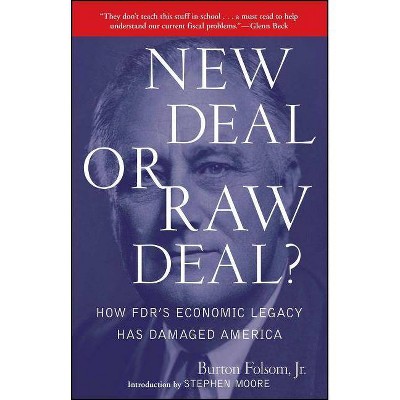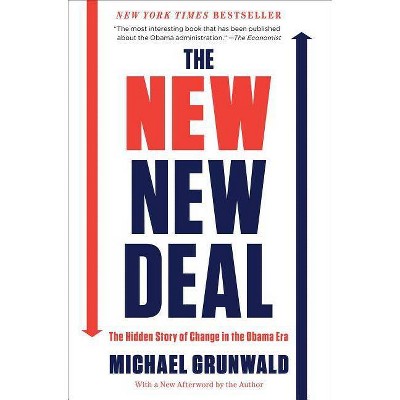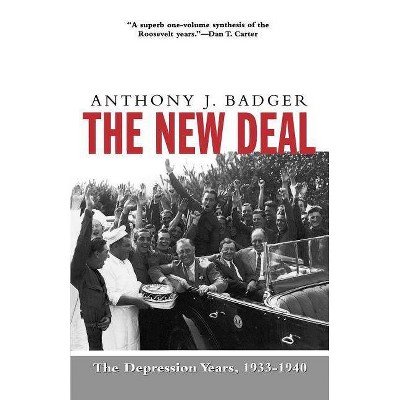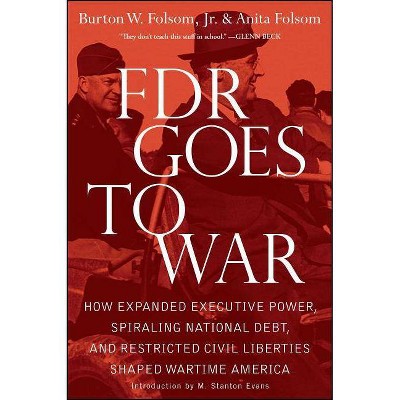New Deal or Raw Deal? - by Burton W Folsom (Paperback)

Similar Products
Products of same category from the store
AllProduct info
<p/><br></br><p><b> About the Book </b></p></br></br>"A sharply critical new look at Franklin D. Roosevelt's presidency reveals government policies that hindered economic recovery from the Great Depression -- and are still hurting America today. In this shocking and groundbreaking new book, economic historian Burton W. Folsom exposes the idyllic legend of Franklin D. Roosevelt as a myth of epic proportions. With questionable moral character and a vendetta against the business elite, Roosevelt created New Deal programs marked by inconsistent planning, wasteful spending, and opportunity for political gain -- ultimately elevating public opinion of his administration but falling flat in achieving the economic revitalization that America so desperately needed from the Great Depression. Folsom takes a critical, revisionist look at Roosevelt's presidency, his economic policies, and his personal life. Elected in 1932 on a buoyant tide of promises to balance the increasingly uncontrollable national budget and reduce the catastrophic unemployment rate, the charismatic thirty-second president not only neglected to pursue those goals, he made dramatic changes to federal programming that directly contradicted his campaign promises. Price fixing, court packing, regressive taxes, and patronism were all hidden inside the alphabet soup of his popular New Deal, putting a financial strain on the already suffering lower classes and discouraging the upper classes from taking business risks that potentially could have jostled national cash flow from dormancy. Many government programs that are widely used today have their seeds in the New Deal. Farm subsidies, minimum wage, and welfare, among others, all stifle economic growth -- encouraging decreased productivity and exacerbating unemployment. Roosevelt's imperious approach to the presidency changed American politics forever, and as he manipulated public opinion, American citizens became unwitting accomplices to the stilted economic growth of the 1930s. More than sixty years after FDR died in office, we still struggle with the damaging repercussions of his legacy." -- Book cover.<p/><br></br><p><b> Book Synopsis </b></p></br></br><b>A sharply critical new look at Franklin D. Roosevelt's presidency reveals government policies that hindered economic recovery from the Great Depression -- and are still hurting America today.</b> <p/> In this shocking and groundbreaking new book, economic historian Burton W. Folsom exposes the idyllic legend of Franklin D. Roosevelt as a myth of epic proportions. With questionable moral character and a vendetta against the business elite, Roosevelt created New Deal programs marked by inconsistent planning, wasteful spending, and opportunity for political gain -- ultimately elevating public opinion of his administration but falling flat in achieving the economic revitalization that America so desperately needed from the Great Depression. Folsom takes a critical, revisionist look at Roosevelt's presidency, his economic policies, and his personal life. <p/> Elected in 1932 on a buoyant tide of promises to balance the increasingly uncontrollable national budget and reduce the catastrophic unemployment rate, the charismatic thirty-second president not only neglected to pursue those goals, he made dramatic changes to federal programming that directly contradicted his campaign promises. Price fixing, court packing, regressive taxes, and patronism were all hidden inside the alphabet soup of his popular New Deal, putting a financial strain on the already suffering lower classes and discouraging the upper classes from taking business risks that potentially could have jostled national cash flow from dormancy. Many government programs that are widely used today have their seeds in the New Deal. Farm subsidies, minimum wage, and welfare, among others, all stifle economic growth -- encouraging decreased productivity and exacerbating unemployment. <p/> Roosevelt's imperious approach to the presidency changed American politics forever, and as he manipulated public opinion, American citizens became unwitting accomplices to the stilted economic growth of the 1930s. More than sixty years after FDR died in office, we still struggle with the damaging repercussions of his legacy.<p/><br></br><p><b> Review Quotes </b></p></br></br><br>History books and politicians in both parties sing the praises for Franklin Delano Roosevelt's presidency and its measures to get America out of the Great Depression. What goes unappreciated is the fact that many of those measures exacerbated and extended the economic downturn of the 1930s. <i>New Deal or Raw Deal?</i> is a careful documentation and analysis of those measures that allows us to reach only one conclusion: While President Roosevelt was a great man in some respects, his economic policy was a disaster. What's worse is that public ignorance of those policy failures has lent support for similar policies in later years. Professor Burt Folsom has produced a highly readable book and has done a yeoman's job in exposing the New Deal. -- Walter E. Williams, John M. Olin Distinguished Professor of Economics, George Mason University<br><br>I have been proud to support research for this book. -- William F. Buckley, Jr.<br>
Price History
Cheapest price in the interval: 10.99 on November 6, 2021
Most expensive price in the interval: 10.99 on December 20, 2021
Price Archive shows prices from various stores, lets you see history and find the cheapest. There is no actual sale on the website. For all support, inquiry and suggestion messagescommunication@pricearchive.us




















